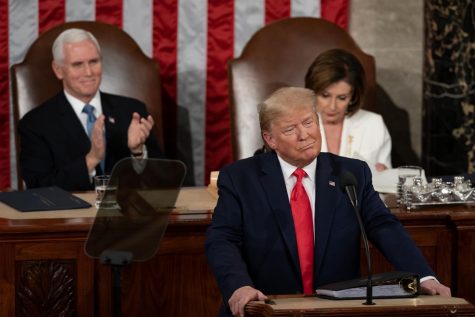Warren v. Zuckerberg: Facebook’s Stance on Political Ads

Warren v. Zuckerberg: Facebook’s Stance on Political Ads
Senator Warren is known for targeting “big tech” companies, but lately she has had her sights set on Facebook. (Courtesy of Flickr)
Senator Warren is known for targeting “big tech” companies, but lately she has had her sights set on Facebook. (Courtesy of Flickr)
October 16, 2019
Hang on for a minute...we're trying to find some more stories you might like.
Email This Story
Over the past week, presidential candidate Elizabeth Warren posted a political advertisement on social media platform Facebook that purposefully contained false information.
The sponsored ad claimed the creator of Facebook, Mark Zuckerberg, had officially endorsed President Trump for reelection. The ad goes on to say explicitly that this is a false claim.
So what was the point of creating a fake political ad on Facebook that didn’t even benefit the candidate that paid for it? To show that Facebook is no longer vetting political ads for lies, a decision that seems to be backfiring on the platform.
According to Facebook, the post has gained hundreds of thousands of views, proving that these false advertisements can reach a wide array of citizens.
But in response, Facebook has chosen to stand its ground. Earlier this week, a spokesperson for the platform stated “If Senator Warren wants to say things she knows to be untrue, we believe Facebook should not be in the position of censoring that speech.”
In comparison, several cable news networks, such as CNN, have refused to run any political ad that is promoting falsehoods. Facebook’s advertising system, similar to CNN’s, is not subject to any form of regulation other than its own.
There are several reasons why Facebook should take another look at which political advertisements it allows on its site, but I will focus on a few.
First of all, if Facebook continues with this policy, those in charge will have to accept that they are proponents of spreading misinformation. Considering Facebook has been doing what it can to improve its platform integrity, this seems like a step backward.
Secondly, Facebook permitting lies on specifically political ads could lead to the site once again playing a key role in the presidential election, and not in a positive way. Let’s not forget the many advertisements Russian trolls created in order to guarantee Donald Trump his spot in office.
The next issue is the one Senator Warren particularly focused on: that this new policy puts Facebook in the position of profiting from the lies of politicians. By choosing not to vet which kinds of ads are allowed to run, Facebook is free to make revenue off every politician that chooses to utilize the platform.
Finally, you have the icing on the cake. Facebook reaches seven out of ten American adults, and 74% of those seven visit Facebook at least once a day. These false ads have more power than any advertisements run on television, and therefore have the power to do much more harm than television ads.
Overall, I find this move to be completely irresponsible. Zuckerberg knows that his platform stands to profit off these ads, and has no care for the harm they can and will do to our nation’s democratic process.
Facebook should have higher standards for what it allows on its site in general, but at the very least, it could prevent people from spreading libel.
Neither political party should want a repeat performance of 2016. Regardless of who you plan to vote for in the upcoming elections, Americans should want an honest race from all of their candidates.
Briana Scalia, FCRH ’20, is a journalism major from Long Island, N.Y.











If you want a picture to show with your comment, go get a gravatar.